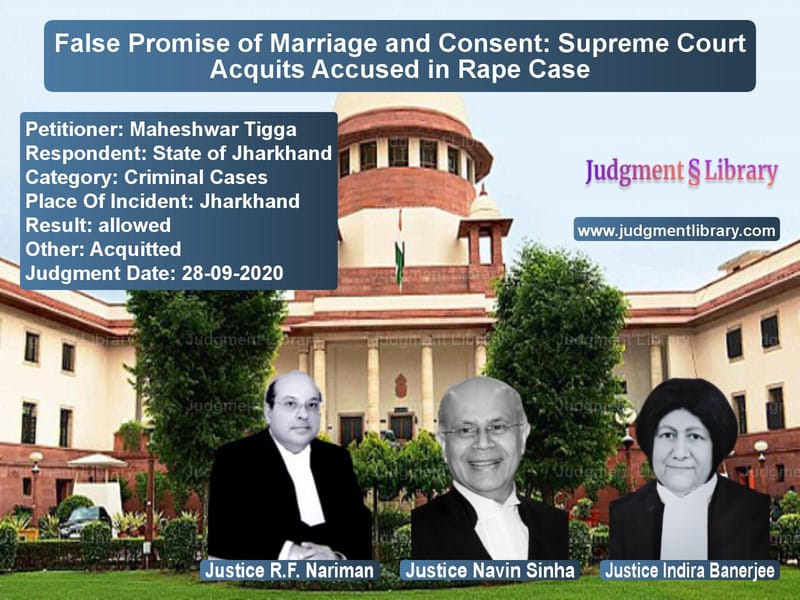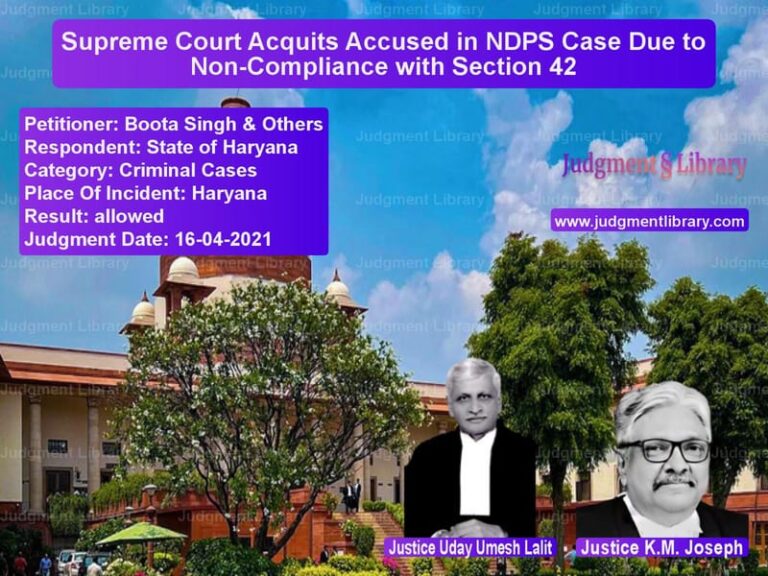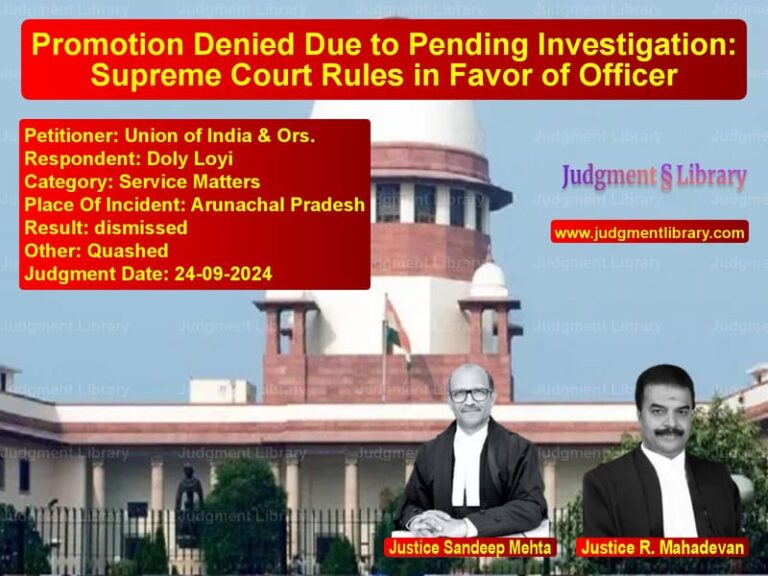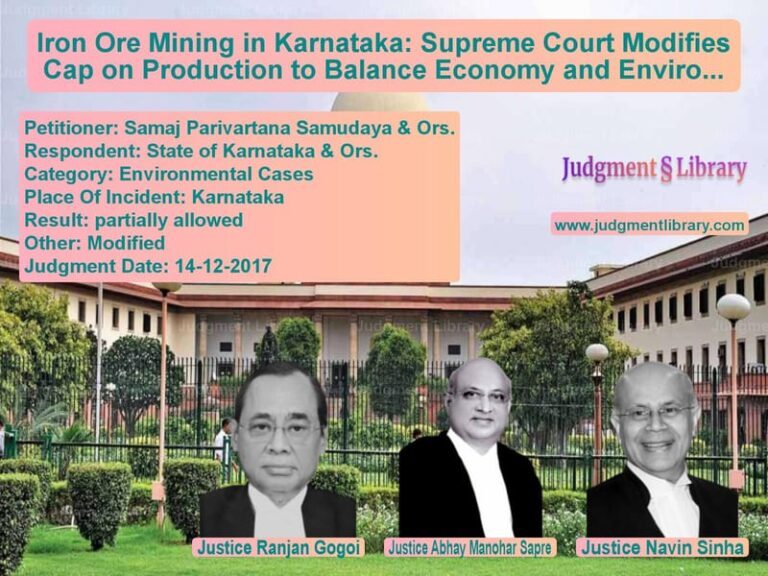False Promise of Marriage and Consent: Supreme Court Acquits Accused in Rape Case
The Supreme Court of India, in the case of Maheshwar Tigga vs. State of Jharkhand, addressed an important legal issue concerning the interpretation of consent under Section 375 IPC when sexual relations occur on the promise of marriage. The Court examined whether the accused had misrepresented his intention to marry, thereby vitiating the prosecutrix’s consent, or whether the relationship was consensual and the allegations were made due to a failed relationship.
The Court’s ruling provides clarity on when a false promise to marry constitutes rape under the Indian Penal Code and underscores the need for proving deliberate fraud or deception by the accused.
Background of the Case
The appellant, Maheshwar Tigga, was convicted under Sections 376, 323, and 341 IPC by the Additional Judicial Commissioner, Ranchi, sentencing him to seven years of rigorous imprisonment for rape, one year for voluntarily causing hurt, and one month for wrongful restraint. The Jharkhand High Court upheld the conviction, leading to the present appeal before the Supreme Court.
The prosecutrix alleged that the appellant had established sexual relations with her over four years on the pretext of marriage. She claimed that five days before filing the FIR, the appellant had again established physical relations with her, only to later refuse marriage and proceed with another wedding.
Legal Issues and Arguments
The main legal issues in this case were:
- Whether the prosecutrix’s consent was obtained under a false promise of marriage, making it invalid under Section 375 IPC.
- Whether the appellant had intentionally deceived the prosecutrix regarding his intent to marry.
- The significance of a prolonged relationship and whether it indicated mutual consent rather than coercion.
Petitioner’s Arguments (Maheshwar Tigga)
The appellant’s counsel presented the following arguments:
- The prosecutrix’s FIR was lodged four years after the alleged first instance of sexual relations, raising doubts about its credibility.
- The prosecutrix admitted in cross-examination that no rape occurred on the alleged date, weakening her case.
- Letters exchanged between the appellant and the prosecutrix, as well as their photographs, indicated a long-standing love affair rather than coercion.
- The appellant’s Scheduled Tribe status and the prosecutrix’s Christian background were significant social obstacles to marriage, known to both parties from the outset.
- The prosecutrix willingly entered the relationship and stayed with the appellant for 15 days, indicating her consent.
Respondent’s Arguments (State of Jharkhand)
The prosecution countered by arguing:
- The prosecutrix consistently stood by her allegations and had no reason to falsely implicate the appellant.
- The delay in filing the FIR was justified as attempts were made to reach a compromise before initiating legal action.
- The prosecutrix was a minor (14 years old) at the time of the first instance of sexual relations, making consent irrelevant under the law.
- The appellant had misrepresented his intent to marry, thereby inducing the prosecutrix into a relationship under false pretenses.
Supreme Court’s Ruling
The Supreme Court ruled as follows:
- The prosecutrix’s age was uncertain due to conflicting testimonies and lack of school records, necessitating the benefit of the doubt for the accused.
- The FIR was filed after four years, right before the appellant’s planned marriage, raising doubts about its credibility.
- The evidence indicated a prolonged relationship based on mutual affection rather than coercion or deceit.
- For a false promise to marry to constitute rape, the prosecution must prove that the accused never intended to marry from the beginning. This was not established in the present case.
- The relationship was consensual, and there was no deliberate fraud or deception by the appellant.
Accordingly, the Court set aside the conviction and directed the immediate release of the appellant.
Legal Principles Established
This ruling reinforces several key legal principles:
- Consent in Long-Term Relationships: A long-standing consensual relationship cannot be criminalized merely because it did not culminate in marriage.
- False Promise vs. Failed Relationship: A promise to marry does not become false merely because it is later broken due to social or personal reasons.
- Delayed FIRs and Credibility: Unexplained delays in filing FIRs in cases of alleged rape can raise doubts about the prosecution’s case.
- Burden of Proof on the Prosecution: The prosecution must prove that the accused had no intention to marry from the outset to establish a charge of rape based on a false promise.
Conclusion
The Supreme Court’s judgment in Maheshwar Tigga vs. State of Jharkhand provides much-needed clarity on cases involving relationships that do not culminate in marriage. By distinguishing between consensual relationships and cases of deliberate fraud, the Court ensures that criminal law is not misused as a tool for personal grievances.
The ruling serves as an important precedent, reaffirming that false promises must be assessed based on intent at the time of the promise, not on subsequent failures to fulfill it.
Petitioner Name: Maheshwar Tigga.Respondent Name: State of Jharkhand.Judgment By: Justice R.F. Nariman, Justice Navin Sinha, Justice Indira Banerjee.Place Of Incident: Jharkhand.Judgment Date: 28-09-2020.
Don’t miss out on the full details! Download the complete judgment in PDF format below and gain valuable insights instantly!
Download Judgment: Maheshwar Tigga vs State of Jharkhand Supreme Court of India Judgment Dated 28-09-2020.pdf
Direct Downlaod Judgment: Direct downlaod this Judgment
See all petitions in Rape Cases
See all petitions in Bail and Anticipatory Bail
See all petitions in Juvenile Justice
See all petitions in Custodial Deaths and Police Misconduct
See all petitions in Extortion and Blackmail
See all petitions in Judgment by Rohinton Fali Nariman
See all petitions in Judgment by Navin Sinha
See all petitions in Judgment by Indira Banerjee
See all petitions in allowed
See all petitions in acquitted
See all petitions in supreme court of India judgments September 2020
See all petitions in 2020 judgments
See all posts in Criminal Cases Category
See all allowed petitions in Criminal Cases Category
See all Dismissed petitions in Criminal Cases Category
See all partially allowed petitions in Criminal Cases Category







